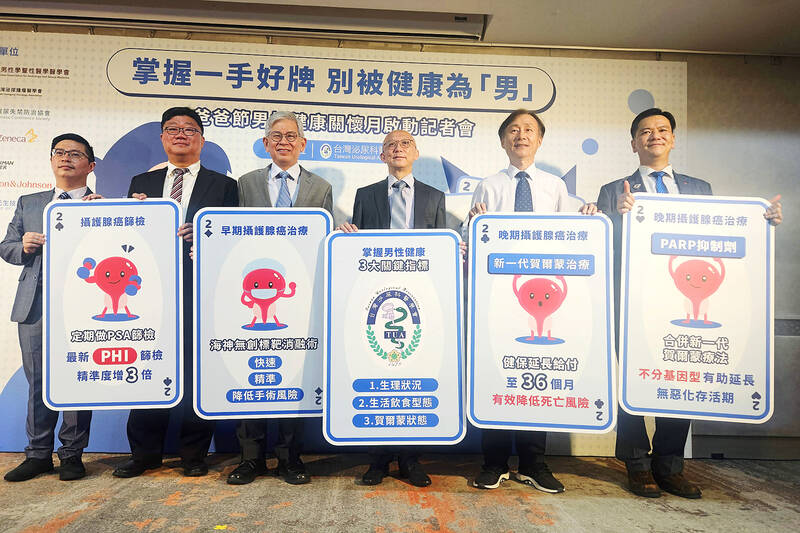Doctors on Monday urged men aged 50 or older to get a prostate cancer screening every year, and those with a family history of the disease should get a screening test every year after the age of 45.
Former US president Joe Biden, 82, has been diagnosed with prostate cancer with the cancer cells having spread to the bone, a statement from his office said on Sunday.
Several physicians in Taiwan yesterday shared health information on social media or answered reporters’ questions about prostate cancer.

Photo: CNA
Taiwan Urological Oncology Association president Wang Hung-jen (王弘仁), a physician at Kaohsiung Chang Gung Memorial Hospital, said the risk of developing prostate cancer increases with age in men, and those with a family history of prostate cancer face a higher risk.
Symptoms of prostate cancer are very similar to those of benign prostatic hyperplasia (BPH), also known as enlarged prostate, and a further prostate-specific antigen (PSA) testing — a blood test — is needed to diagnose prostate cancer, he said.
No matter the cause, men with urinary symptoms should seek medical attention as early as possible, Wang said, adding that the five-year survival rate of stage 4 (metastatic) prostate cancer is lower than 50 percent.
Prostate cancer does not usually cause any symptoms until it has grown large enough to put pressure on the urethra, then it might have similar symptoms as BPH, including frequent urination, difficulty starting urination, weak urine stream, and feeling of not emptying the bladder completely, according to British National Health Service Web site.
PSA is not included in the government-funded cancer screening program, so about 30 percent of people with prostate cancer are diagnosed at stage 4, Wang said.
Early-stage prostate cancer often has no symptoms, so many people are diagnosed in late stages after it spreads to the bones or bladder, causing bone pain or blood in the urine, Shin Kong Wu Ho-Su Memorial Hospital urologist Lee Bing-rue (李秉叡) said.
Prostate cancer has a significant heritable component, so men with a family history of prostate cancer are advised to get a PSA screening every year after the age of 45, while all men should get tested yearly after age of 50, he said.
Taipei-based urologist Gu Fang-yu (顧芳瑜) wrote on Facebook that the Health Promotion Administration’s 2022 cancer statistics showed prostate cancer has become the third-most common cancer in men, but many men often dismiss their urinary symptoms, mistaking it for BPH.
Other screening methods include prostate health index tests (a blood test), digital rectal examinations (physical examination), magnetic resonance imaging scans and prostate ultrasound scans, Gu said.
Taipei Veterans General Hospital’s Division of Genetics and Prenatal Diagnosis head Chang Chia-ming (張家銘) wrote on Facebook that prostate cancer risk factors include age, race and family history, but they also include lifestyle and exposure to certain environmental pollutants.
While age cannot be reversed and inherited genes cannot be changed, men can maintain a healthier lifestyle and avoid exposure to pollutants to reduce the risk of prostate cancer, he said.
Chang suggested men to eat more vegetables, beans and legumes, and garlic, reduce consumption of processed and unhealthy fats, exercise regularly, and avoid obesity and exposure to chemicals such as Bisphenol A.
Additional reporting by CNA

Taiwan is to have nine extended holidays next year, led by a nine-day Lunar New Year break, the Cabinet announced yesterday. The nine-day Lunar New Year holiday next year matches the length of this year’s holiday, which featured six extended holidays. The increase in extended holidays is due to the Act on the Implementation of Commemorative and Festival Holidays (紀念日及節日實施條例), which was passed early last month with support from the opposition Chinese Nationalist Party (KMT) and Taiwan People’s Party. Under the new act, the day before Lunar New Year’s Eve is also a national holiday, and Labor Day would no longer be limited

COMMITMENTS: The company had a relatively low renewable ratio at 56 percent and did not have any goal to achieve 100 percent renewable energy, the report said Pegatron Corp ranked the lowest among five major final assembly suppliers in progressing toward Apple Inc’s commitment to be 100 percent carbon neutral by 2030, a Greenpeace East Asia report said yesterday. While Apple has set the goal of using 100 percent renewable energy across its entire business, supply chain and product lifecycle by 2030, carbon emissions from electronics manufacturing are rising globally due to increased energy consumption, it said. Given that carbon emissions from its supply chain accounted for more than half of its total emissions last year, Greenpeace East Asia evaluated the green transition performance of Apple’s five largest final

Taiwan is to extend its visa-waiver program for Philippine passport holders for another year, starting on Aug. 1, Minister of Foreign Affairs Lin Chia-lung (林佳龍) said on Friday. Lin made the announcement during a reception in Taipei marking the 127th anniversary of Philippine independence and the 50th anniversary of the establishment of the Manila Economic and Cultural Office (MECO) in Taiwan, the Ministry of Foreign Affairs said. The decision reflected Taiwan’s commitment to deepening exchanges with the Philippines, the statement cited Lin as saying, adding that it was a key partner under the New Southbound Policy launched in 2016. Lin also expressed hope

Temperatures in New Taipei City’s Sindian District (新店) climbed past 37°C yesterday, as the Central Weather Administration (CWA) issued heat alerts for 16 municipalities, warning the public of intense heat expected across Taiwan. The hottest location in Taiwan was in Sindian, where the mercury reached 37.5°C at about 2pm, according to CWA data. Taipei’s Shilin District (士林) recorded a temperature of 37.4°C at noon, Taitung County’s Jinfeng Township (金峰) at 12:50 pm logged a temperature of 37.4°C and Miaoli County’s Toufen Township (頭份) reached 36.7°C at 11:40am, the CWA said. The weather agency yesterday issued a yellow level information notice for Taipei, New